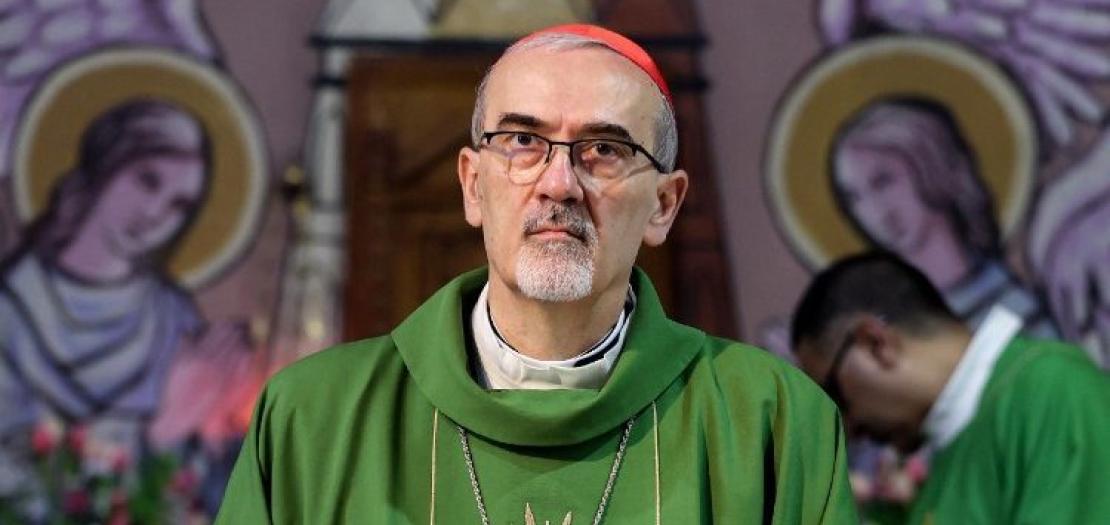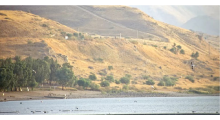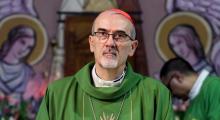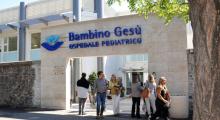Issued by the Catholic Center for Studies and Media - Jordan. Editor-in-chief Fr. Rif'at Bader - موقع أبونا abouna.org

Gaza remains under Israeli bombardment, even just hours ago. It is crucial to move toward phase two of the United States’ plan, leading to a political process aimed at achieving a two-state solution.
After the Security Council’s adoption of the resolution, the United Nations has committed itself to pressing forward and “translating diplomatic momentum into concrete and urgent measures on the ground.” These concrete actions must take the form of steps that, many hope, can become a turning point for Palestinians exhausted by war and devastation.
Speaking to Vatican News, Cardinal Pierbattista Pizzaballa, Latin Patriarch of Jerusalem, urges the international community to take the necessary steps to implement solutions that might bring relief to a people who are reeling from two years of bombings and now suffering the harsh winter conditions.
Your Eminence, the UN Security Council—Russia and China abstaining—has voted in favor of the Gaza peace plan proposed by U.S. President Trump. The State of Palestine approves the plan, while Hamas says it will not disarm under those conditions. What is your response to the UN’s decision, and how do you see the current situation? Is there hope?
The UN’s decision does not change anything on the ground, but it is nonetheless a recognition by the international community. Like all plans, it can never be perfect, but it is what we have. It is the only plan that has so far halted the expansion of the war and can offer at least a glimmer of hope for the Palestinian population—and not just for them.
So, we might say the UN vote is a sort of general endorsement by the international community that, while it changes nothing materially, is still important from an ideal and political standpoint. As for daily life in the region and the plan’s concrete implementation, from the outset we knew that the various points of the Trump plan would be—and will remain very difficult—to carry out.
We know Hamas has no intention of handing over its weapons. I think Israel also has little desire to withdraw entirely from the Strip. Both parties were required to accept this plan, but they face very real obstacles. Persistence is needed. The United States, together with Arab countries and Turkey, are the only ones capable of driving progress, because goodwill alone is not enough at this moment. Political courage is also needed to create solutions that can gradually lead to clearer prospects. But it will take a long time, and it will be exhausting.
Recently, Gaza has fallen out of the media spotlight. Yet alarming reports continue to arrive from the Strip about the people’s suffering, worsened by bad weather, rain, and mud—something even the parish priest, Father Gabriel Romanelli, has spoken about. What is the situation? Can aid enter? What can be done concretely to help the Palestinians?
Ordinary life has changed very little. The only difference—thanks be to God and to those who secured it—is the end of the blanket bombing. Aid is entering more regularly than before, and more reliably, but still far from sufficient given the needs for medicine, hospitals, tents, blankets—especially with winter arriving. Water is needed—of course—but in Gaza “water” often means mud in an already dire situation.
So, in daily life nothing has really changed. There are no schools; hospitals are only partially operational; everything needs to be rebuilt. We are still in phase one: clearing rubble, uncovering and burying the dead still beneath it, and preparing even a minimal reconstruction plan—which also requires a governance that does not yet exist and whose form is unknown.
Everything remains to be done. And while the UN and others discuss the future, people continue to live in the same tragic conditions as before.
Alarming news also continues to come from the West Bank, especially with ongoing settler violence—mosques burned, villages attacked, Palestinians prevented from harvesting their olives. While there seems to be a growing awareness of the gravity of these acts within Israel, strong international action is still lacking. Without it, any future Palestinian state with real territorial cohesion becomes practically impossible. What can you tell us about the situation there? What should—or could—the international community do? And what can we do?
The situation in the Territories is worsening every day. I have photos from yet another attack on our Christian village of Taybeh: homes and cars vandalized, windows smashed, tires slashed. What happened last night in Taybeh—serious as it is—happens daily in many Palestinian villages. A few days ago, I received a request for help from the village of Aboud—quite isolated—not only from the parish but from the entire community, including the mayor, because they simply do not know whom to turn to.
This sense of helplessness intensifies the weight of the situation: it seems there is no one to appeal to, no one to ask for justice. True, there have recently been some clashes between settlers and the army trying to restore order, but these are rare episodes. Most of the time, one witnesses a total lack of respect for the law—any law—and for human rights. Our fear is that the situation will continue and worsen.
What can the international community do? It must speak out! Gaza was rightly discussed at length, though sadly now less so; but the situation in the Territories requires attention as well. Many countries have recently recognized Palestine as a state—symbolically, since it does not yet exist. But now they must go further and outline the conditions and steps required. One cannot speak of a political process while these aggressions and hardships continue. I say this with a heavy heart because I do not like to spend my time denouncing things. But it is the truth, and I cannot remain silent.
Your Eminence, you recently appealed for the resumption of pilgrimages to the Holy Land, which remain suspended—with serious consequences for the Palestinian economy, especially for Christians. Can you speak on this? Can you renew your invitation for pilgrims to return to the places where Jesus lived, died, and rose?
Absolutely! We speak of Gaza and the West Bank, but those areas are generally not part of pilgrims’ ordinary itineraries. The Bethlehem area—which is so important for pilgrims—needs their presence, and pilgrimages are safe now. With the ceasefire, not only have the bombings in Gaza stopped, but also missile attacks from Yemen. There are no more alarms. It is safe to make a pilgrimage now.
The few who have come have seen this for themselves. I repeat: the universal Church has been very close to us these years through prayer and concrete solidarity. But now a new phase is needed: concrete help shown also through physical presence. This does not bring not only spiritual benefit to the pilgrim. It also brings smiles to the many families who need not only financial help, but to see their Christian brothers and sisters present in the Holy Land.
We are in the Jubilee Year, which is coming to an end. Many hoped that it would draw attention both to Rome and Jerusalem. These two cities are bound to one another. We cannot wait for the next Jubilee; we must resume the sacred journey now and return to our roots of faith—a form of solidarity and Christian fraternity.
We still have before our eyes the terrible images of Hamas’ hostages in the tunnels. Yet we also hear new reports—without images—telling us that since 7 October, ninety-eight Palestinian detainees have died in Israeli prisons: one death every four days, amid allegations of human rights abuses. How do you respond to these figures?
They are alarming. Several newspapers, including in Israel and the Holy Land, have reported on this—though few, to be honest. In general, a climate of violence pervades everything, including how people think. I have often said that we have been invaded by hatred, which is not only a sentiment but turns into action and becomes a way of relating to others.
Hatred, revenge, resentment express themselves in these forms too. I do not have precise documentation; I rely on what has been reported. But yes, many have died in prison—and we know these are not Swedish prisons.
Your Eminence, at a recent conference you noted that in these past two years of war, religious leaders have often issued messages identical or similar to those of political leaders, effectively undermining interreligious dialogue. What is—or should be—the role of religions in this context?
Yes, I have said this several times, and it’s with sadness that I repeat it. Interreligious dialogue must resume because it is part of our religious identity; no religion is an island. We must reclaim it and give this witness as religious leaders and communities—especially in the Middle East, where religion plays a crucial identity-forming role in civil, social, and even political life.
And it is a fact that—with few exceptions—most local religious leaders have said nothing, or when they did speak, they spoke only to their own people, from their own perspective, without even a glance toward the other. And when there was a glance, it was negative—a look of accusation or defense. All of this is concerning. We must break this vicious cycle.
I do not speak only of Jews and Muslims; we Christians are in this too. We cannot pretend otherwise. After 7 October, we need to resume dialogue—not only recalling what we said in the past, but also what we have failed to say in these two years, and why. We must begin again by listening.
I’ve often expressed something that is quite challenging: we must not begin with analysis, but by listening to one another’s pain. Everyone is weighed down by their own suffering. But there is also a disturbing inability—or refusal—to see the pain of others. Victimhood is one of our problems: everyone sees themselves as the sole victim and the other as the perpetrator.
We must break out of this. Things do not change on their own; they change when someone opens a way. We must open, or reopen, that path. It will be arduous, but this is the task of religious leaders. You cannot look toward God and deny your neighbor—yet that is exactly what we have done.
Italian Bishop Tonino Bello used to say that war begins when the face of the other fades away. Perhaps we could say that peace begins when we listen to the pain of others…
Absolutely. If you recognize the other, you also recognize yourself. If you deny the other, you deny yourself. If the face of the other disappears, in the end your own disappears as well. We must look toward God, and rediscover ourselves in one another.
 Archaeologists identify the site where Lord Jesus exorcised the legion of demons and the herd of pigs
Archaeologists identify the site where Lord Jesus exorcised the legion of demons and the herd of pigs  The Fifth International Congress of the Commissaries of the Holy Land kicks off, November 19
The Fifth International Congress of the Commissaries of the Holy Land kicks off, November 19 




